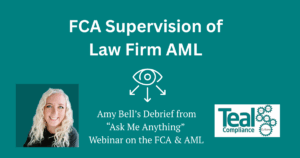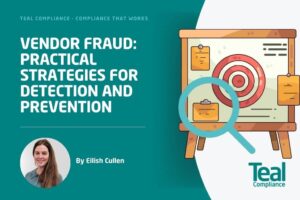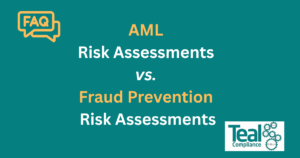On 5 June, Amy Bell and Simon Harbord hosted one of our lively and insightful webinars, offering a “crystal ball” gaze into the SRA’s Business Plan and Budget Consultation. You can catch up on the recording HERE.
At the time of writing, the consultation closes 19th June and here’s the Link to the SRA’s Consultation for your Responses.
For UK law firms, particularly compliance officers, MLROs, and MLCOs, understanding these regulatory currents is super important. This blog distils the key discussions, helping you anticipate what’s coming down the road and how to prepare your firm practically. If you were able to jump on the actual webinar, this is a debrief of the whole chat.
Don’t forget to SUBSCRIBE to our mailing list for first dibs at our free webinars and updates.
This debrief guide focuses on:
- Continuing Competence
- Transparency Rules
- Economic Crime Prevention
- The Rise of AI
- Client Money & Professional Ethics
- LSB’s Directive
The SRA's Strategic Compass: Where Are We Heading?
Amy kicked off by highlighting that the SRA’s latest consultation isn’t entirely new; it’s the budget roadmap for their existing 2023-2026 strategy. However, subtle shifts and external directives from the Legal Services Board (LSB) are adding new dimensions. The core message? The SRA is increasingly adopting a “firm-based approach,” moving beyond individual conduct to scrutinise a firm’s overall compliance framework.
The discussion quickly moved to the critical themes underpinning the SRA’s plan:
- Maintaining High Professional Standards: This remains fundamental, with an emphasis on robust internal policies and continuous training.
- Addressing Risk & Upholding Confidence: A focus on high-risk areas, serious misconduct, and safeguarding the Compensation Fund.
- Promoting Access to Quality Legal Services: The SRA is keen on firms demonstrating transparency and accessibility in their service delivery.
- Driving Regulatory Innovation: Expect the SRA to explore new technologies and ways of working, which could impact how firms report or are investigated.
The Hot Topics from the Consultation
Amy and Simon didn’t just skim the surface; they delved into the specifics that truly impact firms:
1. Continuing Competence: More Than Just a Tick Box?
Since the SRA removed compulsory CPD, there’s been a concern about whether firms are genuinely assessing and maintaining competence. Amy noted that while the “continuing competence” principle is sound (why train if you already know it?), the challenge lies in knowing what you don’t know.
Simon shared his observations, particularly from an AML perspective:
- Testing is Back: Firms are increasingly implementing tests at the end of training sessions, ensuring engagement and understanding.
- Controls are Key: The SRA is now asking about internal controls – how do you ensure policies are followed? Are people actually doing file reviews to the right standard?
- Training & Performance Link: Simon revealed that some firms are now linking training attendance and file quality to holiday approvals or even disciplinary action. Ouch!
Practical Takeaway: Don’t just confirm competence; demonstrate it. Consider systems (like Teal Tracker’s competence module) to assess and record individual training needs and outcomes. Ensure your training isn’t just about the rules, but how they apply specifically to your firm’s practice.
2. Transparency Rules: Are You Really Compliant?
Despite previous thematic reviews, many firms still aren’t fully compliant with transparency rules. Simon highlighted the Legal Services Consumer Panel’s push for more consumer information, not just on price, but also on quality indicators (e.g., complaints data).
Amy brought up a critical point: the “proximity” of information. The SRA defines “proximate” as just 1-3 clicks away, and firms are getting fixed penalty fines for not meeting this, even if the information is on their website.
The recent consultation on complaints was also discussed, with the controversial idea of firms actively inviting complaints. Amy challenged the evidence for this, noting the SRA’s own data suggests most clients already know how to complain.
Practical Takeaway:
- Review your website: Is all required information genuinely 1-3 clicks away?
- Gather feedback: Are you proactively seeking feedback (positive and negative) from clients at the end of matters? Integrate this into your billing or closing process to ensure it happens.
- Challenge where appropriate: If you receive a fine or disciplinary finding, don’t just accept it. Seek a second opinion, especially if you have evidence that contradicts the SRA’s assessment.
3. Economic Crime Prevention: The AML Onslaught Continues
AML remains a significant focus. Amy noted the SRA’s acknowledgment that investigation timescales are too long, leaving firms in limbo. Simon recounted examples of firms being hit with broad requests to review all open files for AML risk assessments, an impractical demand that often leads to months of internal hassle.
The discussion also touched on:
- Unlimited Fining Powers: The SRA is consulting on how to apply these, raising concerns about potential overreach beyond just money laundering offences.
- “Pay Up and Go Away” Mentality: Amy and Simon discussed how firms sometimes opt to pay fines, even if they disagree, just to make the issue disappear. However, this can have long-term consequences for PII premiums and panel memberships. Amy urged firms to get a second opinion on such findings.
Practical Takeaway:
- Proactive file closing: Encourage fee earners to close files promptly; the SRA is less likely to ask for reviews of closed matters.
- Second opinions: If you face an SRA investigation or fine, seriously consider getting independent expert advice.
- Focus on demonstrable compliance: It’s not enough to have policies; you must follow them.
4. The Rise of AI: Regulation Lagging Innovation?
Simon highlighted the emergence of the first entirely AI-driven law firm (Garfield Law) and the lack of clear SRA guidance on AI use. This raises crucial questions:
- Who Carries the Can? If AI generates incorrect advice, where does the liability lie?
- Supervision: How do firms supervise AI-generated work, especially when it might replace paralegal tasks?
- False Confidence: Amy expressed concern that AI might give lawyers false confidence to take on work they’re not truly competent in, leading to professional negligence risks.
Practical Takeaway:
- Proceed with caution: While AI offers efficiency, understand its limitations and your ethical obligations.
- Question providers: If using AI or other tech solutions, dig deep into how they work, their reliability, and data security.
- Due diligence on tech: As Amy warned, always know your software contract renewal dates and ensure you’re not locked into unsuitable agreements.
5. Client Money & Professional Ethics: A Shifting Landscape?
The SRA continues to explore options for client money (despite widespread objection to removing client accounts) and is concerned about the “cosiness” between firms and their reporting accountants.
Read Amy’s thoughts on client accounts and TPMAs
A more profound concern raised by Amy was the “political blurring” of professional ethics and morals. Criticising lawyers for who they act for (rather than how they act) is dangerous territory for the rule of law. She argued that the narrative around solicitor trustworthiness, perhaps fuelled by isolated incidents like Axiom Ince, doesn’t reflect the reality of the vast majority of the profession.
Practical Takeaway:
- Stay vigilant on client money: While the last consultation saw strong pushback, watch for further proposals.
- Protect professional ethics: Be aware of the broader discussions around a solicitor’s role and be prepared to defend the principle of acting for all, regardless of personal moral judgment.
- Independent audits: If you’re undertaking an AML audit, ensure your auditor is truly independent and that the scope of the audit (number of files, interviews) is genuinely appropriate for your firm’s size and risk profile. Don’t simply opt for the cheapest or quickest option without thorough justification.
The LSB's Directives: More on the SRA's Plate
Beyond the business plan, the LSB has issued further directives to the SRA, particularly regarding governance and consistency. Amy noted that while some SRA interactions are pragmatic, others feel like “speaking to a brick wall,” lacking consistency, especially with the magnitude of fines being levied.
Simon emphasised the need for the SRA to “up their game” in communicating expectations clearly, particularly given instances like the firm fined for 15 years of AML failures, a situation he believes the SRA bears some responsibility for not detecting sooner.
Real-World Enforcement - A Timely Reminder
In recent cases like Holden Smith Law (April 2025), the SRA imposed a fine of over £36,000 for failures that spanned five years, including missing client and matter risk assessments. Similarly, this month we heard how Tolhurst Fisher were fined £120k for AML breaches spanning 15 years click here for further information
In another high-profile case, Simpson Thacher & Bartlett LLP was fined £362,000 for inadequate AML procedures stretching from 2017 to 2023, further evidence that regulators are looking at historic conduct when justified.
Conclusion of Webinar - Proactive Compliance is Your Best Form of Defence
The webinar underscored a critical message: the SRA is evolving, and so too must firms. Compliance isn’t just about avoiding trouble; it’s about building a resilient, trusted, and efficient practice. By staying informed, engaging with consultations, and proactively implementing robust internal controls, law firms can navigate the regulatory landscape with confidence.
Feeling overwhelmed by the evolving SRA landscape? Don’t leave your compliance to chance.
At Teal Compliance, we specialise in providing practical, tailored support to law firms. From comprehensive AML audits and policy reviews to bespoke training and strategic guidance on regulatory changes, our team of experts can help you build the robust compliance framework your firm needs to thrive.




